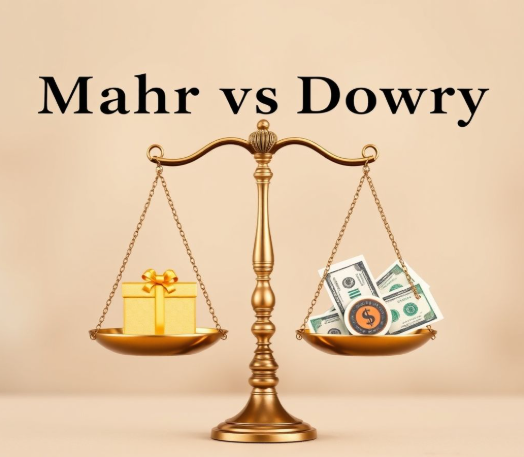
Mahr vs Dowry: A Legal and
Social Comparison in India
Introduction
In many cultures, the institution
of marriage involves the exchange of wealth between families. In Islamic law,
there is a concept called "Mahr", which is a mandatory gift
given by the groom to the bride. However, in Indian society,
particularly in Hindu marriages, the term "Dowry" refers to a
payment or valuable property given by the bride’s family to the groom's family—a
practice that has led to widespread abuse.
While Mahr is a symbol of respect
and financial security for the bride, dowry has often been
associated with harassment, financial burden, and even violence against
women. This article will explore the differences between Mahr and Dowry,
the legal framework governing both practices, and their impact on
women’s rights in India.
2. Understanding Mahr and
Dowry
2.1 What is Mahr?
Mahr (also spelled as Mehr or
Mehar) is a mandatory gift or financial obligation that a Muslim groom
gives to his bride at the time of marriage. It is an essential component
of an Islamic marriage contract (Nikah) and is mentioned in the Quran
and Hadith.
- Mahr can be in the form of money, property,
gold, or any valuable asset that the bride agrees upon.
- It belongs solely to the wife, and she has
the full right to use it as she pleases.
- It is a symbol of respect, financial security,
and the husband's commitment to his wife.
2.2 What is Dowry?
Dowry is the transfer
of money, goods, or property from the bride’s family to the groom’s family
as a condition of marriage. Unlike Mahr, which is given to the bride,
dowry is a burden on the bride’s family and often leads to social and
legal problems.
- Dowry has led to financial exploitation,
domestic violence, and dowry deaths in India.
- It is illegal under Indian law, yet remains a deeply rooted social problem.
3. Differences Between Mahr
and Dowry
|
Feature |
Mahr (Islamic Law) |
Dowry (Indian Society) |
|
Definition |
A financial gift from the groom to the bride |
A demand for money/property from the bride's family to the groom’s
family |
|
Ownership |
Bride owns Mahr entirely |
Dowry is often controlled by the groom’s family |
|
Legal Status |
Mandatory in Islam |
Illegal under Indian law |
|
Purpose |
Financial security for the bride |
A social custom, often leading to exploitation |
|
Consequences |
Non-payment may result in the marriage being invalid |
Dowry demand can lead to harassment, violence, or even death |
4. Legal Framework Governing
Mahr and Dowry in India
4.1 Legal Recognition of Mahr
in India
Mahr is recognized under Muslim
Personal Law and is legally enforceable in Indian courts. If a husband
refuses to pay Mahr:
- The wife can file a legal claim in civil court.
- Non-payment of Mahr can lead to the dissolution
of marriage (Talaq).
- In some cases, the courts have ruled that Mahr
is equivalent to a debt owed by the husband.
4.2 Laws Against Dowry in
India
India has strict laws against
dowry, including:
- The Dowry Prohibition Act, 1961 – Bans
giving, taking, or demanding dowry.
- Section 304B IPC (Dowry Deaths) – If a woman
dies due to unnatural causes within 7 years of marriage, and there is
evidence of dowry harassment, the husband and in-laws can be imprisoned.
- Section 498A IPC (Cruelty Against Wife) –
Protects women from domestic violence related to dowry.
5. Case Laws on Mahr and Dowry
in India
5.1 Landmark Cases on Mahr
- Abdul Kadir vs Salima (1886): Established
that Mahr is an essential right of the wife under Islamic law.
- Shamim Ara vs State of UP (2002): Reinforced
that a wife can legally demand unpaid Mahr even after divorce.
5.2 Landmark Cases on Dowry
- State of Punjab vs Iqbal Singh (1991):
Strengthened the interpretation of dowry-related deaths under Section
304B IPC.
- Nisha Sharma Case (2003): Led to the
arrest of a groom and his family after excessive dowry demands.
6. Social and Legal Impact of
Mahr and Dowry
6.1 How Mahr Empowers Women
- Mahr ensures that women have financial
independence and security after marriage.
- Unlike dowry, Mahr is a right, not a demand,
giving women greater autonomy in marriage.
6.2 How Dowry Harms Women
- Dowry leads to financial burdens on the bride’s
family.
- It is associated with domestic violence,
harassment, and even dowry deaths.
6.3 Need for Legal Reforms
- Strict implementation of dowry laws is
needed to prevent misuse and injustice.
- Public awareness must be increased to
differentiate between Mahr (a right) and Dowry (a crime).
7. Conclusion
The difference between Mahr
and Dowry is fundamental yet misunderstood in Indian society. While Mahr
is a legally enforceable right that protects and empowers Muslim women, dowry
is an illegal practice that leads to financial and physical abuse of women.
Strict enforcement of anti-dowry
laws and increased awareness of Mahr as an Islamic financial safeguard
can help ensure justice and equality in marriages.
8. FAQs
1. Is Mahr compulsory in
Islam?
Yes, Mahr is a mandatory
obligation and a fundamental part of the Nikah contract.
2. Can Mahr be refused by the
groom?
No, refusal to pay Mahr can lead
to legal action and even annulment of the marriage.
3. Is giving Mahr the same as
giving dowry?
No, Mahr is given by the groom
to the bride, while dowry is taken from the bride’s family.
4. What should a woman do if
her Mahr is not paid?
She can file a civil suit
in court to demand her Mahr as a legal right.
5. How can society eliminate
dowry while preserving Mahr?
By strictly enforcing
anti-dowry laws, promoting Mahr as a financial safeguard, and
raising public awareness about their differences.
